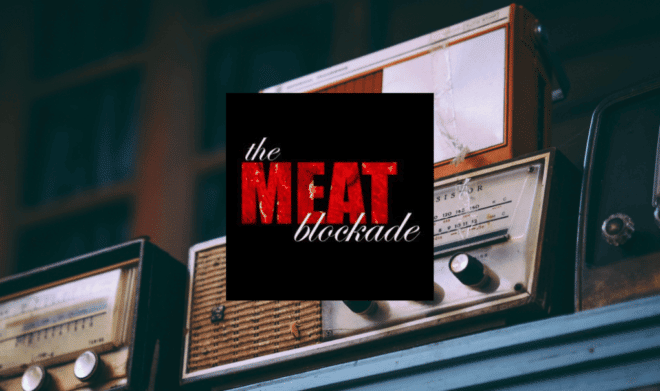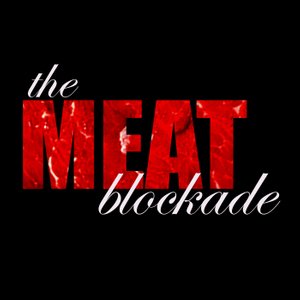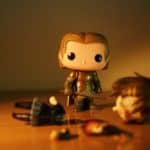The Meat of It, a review of “The Meat Blockade”

During my earlier escapades of podcast exploration, I can confidently say I was at my most experimental. Though it only dates back to a few years ago, I was scrubbing my way through a long list of shows that soon enough became my favorites and those that were lost in time or, inevitably, down my unforgiving chasms of my subscriptions list.
Within a certain time frame, within a certain period of high school, I was finding myself dedicated to a specific span of fiction podcasts that I listened to on an incredibly precise schedule right before I went to bed.
The backdrop of midnight and fading voices of my family before they retreated to bed themselves just felt like the perfect setting for my newest obsession.
First was Welcome to Night Vale, then Kakos Industries, then Hadron Gospel Hour, then Wolf 359 and, at least every few months, whatever fresh hell The Meat Blockade had cooked up for me.

For a show that takes place in the urban mystery city of Nighttown, it only seemed fitting to meet them halfway with choosing the night life to better understand its absurdity.
The Meat Blockade is the brainchild of the brother team Sean and Mike Hennesy who crafted the show out of a drive for exploring themes of Kafka comedy and just generally wanting a fresh new creative space to goof around in.
Main character Karl Berenger is an aspiring writer who’s roped into exploring the city late at night, until he’s separated from his friend and must find a way back home despite the many, many things stopping him from doing so.
“The phrase ‘meat blockade’ came from a crappy poem I wrote about six years ago,” said Sean in an interview I held with the brothers a good three years ago when I questioned them about the creative process behind the show’s creation. “I used the phrase from then on to describe my own phobia of crowds, which feels to me like being stuck in a ‘meat blockade’. We didn’t really have any analytical or symbolic meanings behind why we named the show that, it felt more like having a band name than anything else.”
Despite its weirdness, the reason The Meat Blockade has been on my mind for so long is it’s surprisingly strong narrative structure. Given the flexible framing of the lead being thrown from place to place on a whim with the end-all goal to get back home, The Meat Blockade is able to provide some excellent world building through such a simple plot convenience.
In one episode we’re at a bar, blink twice and we’re on a pirate ship ran by frogs, and yet nothing about it feels out of place due to the tight design and the ways the audio does its absolute best to ensure you’ve seen every nook and cranny of the current location before moving on.
The Meat Blockade is a mystery within a mystery, providing a pretty dense and ridiculous setting, but also one that’s fascinatingly bold and seems to be hiding secrets from its audience in its own special way. Brazen as it is, you can’t deny it wears its inspiration on its sleeves.
One core idea the brothers wanted to execute to their fullest was “kafkaesque”, a brand of storytelling inspired by writer Franz Kafka that specializes specifically in absurdist situations and humorous portrayals of misery.
“I was reading Kafka’s story ‘Description of a Struggle’, and there was something that really struck me about the image in the beginning of the story of two young men walking down the darkened Prague streets at night,” said Sean when I questioned him on the topic. “Just like with any of Kafka’s works, it had the feeling that it could go anywhere, and the story moved in the same manner as a dream.”
Dreamlike is most definitely a term I attribute closely to the show. The way the protagonist interacts with the other characters and world relies on this sort of special brand of absurdity that lets the roads wind anyway it needs to.
Believe it or not, authentic quirkiness is a bit hard to pull off and an especially pretentious part of me has gotten very specific on what levels of weird I can tolerate. Yes, The Meat Blockade is weird for the sake of weirdness, but its literary themes and inspirations give so much more depth to its depravity.
One episode that really solidified my admiration for the show’s out-there nature was definitely episode five’s “The Frog King of the Sewer”, which has a music number that must be heard to be believed.
Solid instrumentals, some great vocals-it’s as if you’ve been teleported to a musical theatre half way through and it doesn’t feel even slightly out of place. In fact, it was an excellent source of world building that provided the background and explanations for the frog pirates singing it.
Though definitely the highlight of the earlier episodes, I’m certain weirder and more wonderful things are to come. The show is still early in its first season-or, more appropriately, volume-with only about eight episodes thus far.
“Our main goal for the structure of the show is to have it divided into three volumes,” Sean explained. “We are currently completing volume one, which the episodes you’ve already heard are a part of, and is called ‘Berenger in Nighttown’, named after the first episode.”
I have a feeling it’ll be well worth the wait seeing as how the sound editing is top notch and way up there with shows like Wolf 359 and Hadron Gospel Hour in terms of building atmosphere.
Though Karl has yet to transform into a cockroach as a metaphor for financial exploitation or stumble upon a mysterious castor, I can definitely say his adventures are only bound to get more bizarre from here. And I just can’t wait to see how.













Comments
Comments are closed.